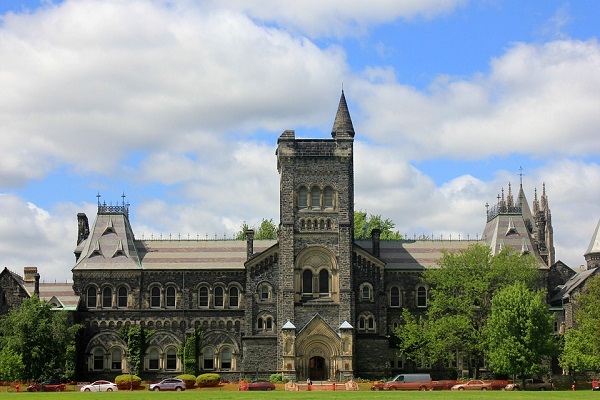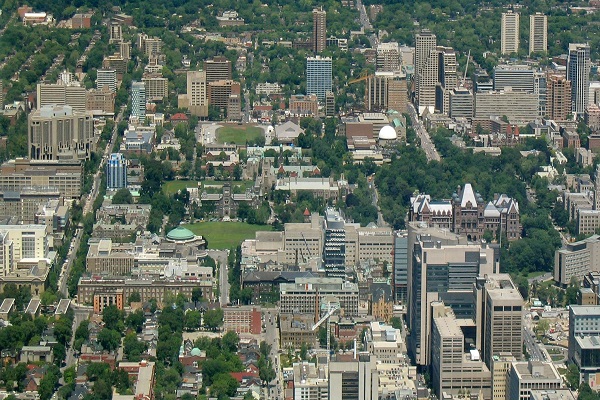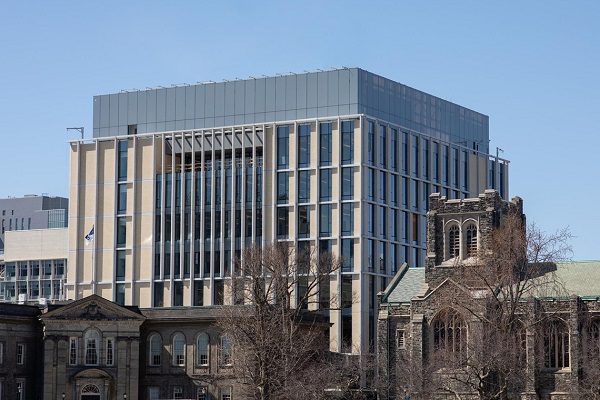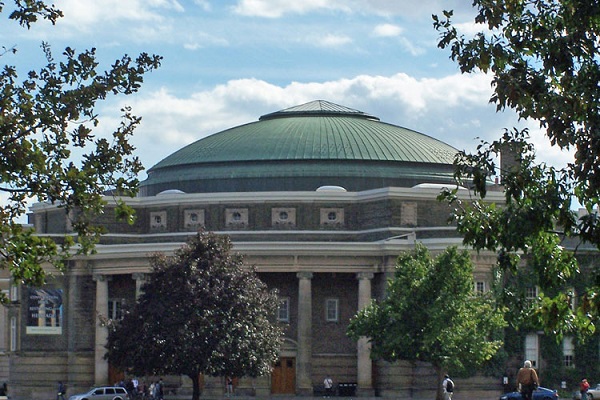University Rankings
- QS World University Rankings 19
- Times Higher Education World University Rankings 20
- Academic Ranking of World Universities 32
- QS Sustainability Ranking 431




Overview and History
The University of Toronto, founded in 1827, is Canada’s top public research university and a global leader in higher education. Located in Toronto, Ontario, it has evolved into one of the world’s most prestigious institutions, renowned for academic excellence, groundbreaking research, and a diverse, dynamic student body. Over nearly two centuries, U of T has built a reputation for producing transformative research, including the discovery of insulin, pioneering stem cell studies, and key contributions to artificial intelligence. Its mission is to advance knowledge, educate global citizens, and address complex challenges facing society through innovation, scholarship, and community engagement.
Campus and Facilities
The University of Toronto operates across three main campuses, each offering a distinct experience. The St. George campus in downtown Toronto features a mix of historic Gothic architecture and state-of-the-art research labs, libraries, and performance spaces. The University of Toronto Scarborough (UTSC) campus emphasizes experiential learning, co-op programs, and environmental research, while the University of Toronto Mississauga (UTM) campus offers modern academic and recreational facilities in a scenic suburban setting. Across all campuses, students benefit from cutting-edge laboratories, world-class libraries, advanced athletic complexes, innovation hubs, and cultural spaces that enrich academic and extracurricular life.
Academic Programs
The University of Toronto offers an unmatched range of undergraduate, graduate, and professional programs, with over 700 undergraduate degrees and more than 200 graduate and doctoral programs. Major academic areas include Arts and Humanities, Social Sciences, Life Sciences, Computer Science, Engineering, Physical Sciences, Business, Law, Public Health, Education, and Policy Studies. U of T’s programs are known for rigorous academic standards, strong interdisciplinary connections, and emphasis on critical thinking, research, and innovation. Many courses are taught in English, and students have the flexibility to design customized learning pathways through double majors, minors, and specialist streams.
Research and Innovation
As one of the world’s top research universities, U of T attracts the highest research funding in Canada and leads numerous global research initiatives. Its faculty and students contribute pioneering work in fields like biomedicine, engineering, computer science, public health, sustainability, and social innovation. The university hosts more than 140 research centers and institutes, including leading-edge labs in AI, regenerative medicine, and environmental studies. U of T collaborates closely with global industry partners, governments, and nonprofit organizations, driving discovery and translating research into real-world solutions that benefit society locally and internationally.
Internationalization
The University of Toronto has a strong global focus, attracting students, scholars, and partnerships from around the world. International students make up a significant portion of the student body, coming from over 160 countries. The university offers numerous international exchange programs, joint and dual degrees with leading global universities, and cross-border research collaborations. Dedicated services such as orientation programs, immigration advising, English-language support, and cultural integration initiatives help international students thrive both academically and socially.
Student Life
Student life at U of T is vibrant and diverse, with over 1,000 clubs, student organizations, and societies spanning cultural, professional, academic, recreational, and political interests. Students can join competitive varsity teams, recreational sports leagues, or arts and performance groups, or participate in entrepreneurship incubators, case competitions, and volunteer initiatives. Toronto’s cosmopolitan setting offers additional opportunities for internships, cultural exploration, and career networking. On-campus events such as guest lectures, conferences, cultural festivals, and career fairs create a dynamic environment where students engage with peers, faculty, and industry leaders.
Admissions and Tuition
Admission to the University of Toronto is highly competitive, with selection based on academic achievement, program prerequisites, and in some cases, supplemental applications, portfolios, or interviews. Graduate and professional programs may also require research proposals, relevant work experience, and strong letters of recommendation. Tuition fees vary depending on program, faculty, and student residency status (domestic or international), but the university offers numerous merit-based scholarships, need-based grants, and external funding opportunities to ensure accessibility for talented students from all backgrounds.
Notable Alumni and Achievements
The University of Toronto has produced a remarkable alumni network that includes Nobel laureates, Rhodes Scholars, heads of state, global business leaders, renowned scientists, and acclaimed writers. Notable alumni include Frederick Banting (co-discoverer of insulin), Lester B. Pearson (Nobel Peace Prize winner and former Canadian Prime Minister), Margaret Atwood (internationally celebrated author), and Roberta Bondar (Canada’s first female astronaut). The university is consistently ranked among the top global universities and is widely recognized for its academic, research, and societal contributions.
News & Updates
 Earth Science Career Paths: Top 5 Universities for a Green Job in 2025
Earth Science Career Paths: Top 5 Universities for a Green Job in 2025by Piyush Chauhan
June 14, 2025
 Earth Science Career Paths: Top 5 Universities for a Green Job in 2025
Earth Science Career Paths: Top 5 Universities for a Green Job in 2025by Piyush Chauhan
June 14, 2025
Courses & Fees
Frequently Asked Questions
To get admission, the applicants are required to meet Toronto University admission requirements. These admission requirements are given below:
Undergraduate Courses
All India Senior School Certificate awarded by CBSE / Indian School Certificate awarded by CISCE. Class 12 State Board exams with excellent results shall also be considered on an individual basis
Note that CBSE students who want to study programs that need Calculus for admissions, like Business, Engineering, and Science programs, must present Class 12 Standard Mathematics for admission consideration
Class 12 Applied Mathematics (Old and New syllabus) shall not meet the Calculus requirement
Graduate Courses
For master’s programs, the applicants must have an appropriate bachelor’s degree, or its equivalent with a final-year average of at least mid-B from a recognised university
For doctoral programs, an appropriate master’s degree, or its equivalent, with an average of at least B+ or demonstrated comparable research competence is required. Some departments directly admit students to a doctoral programme from a bachelor’s degree (Minimum average A- required)
To stand out in University of Toronto admissions, applicants should strictly focus on presenting a positive view of themselves, beyond just academic achievements. Students should highlight their unique experiences, interests, and perspectives to help the examiner or the interviewer understand the applicant's potential. Students must talk about experiences and challenges that they've overcome, as that shows how the candidate takes on tasks during tough times. But again, students must not overdo things and boast about themselves in the mode of explaining themselves. Applicants are also suggested to have strong SOPs and LOR which can persuade the examiner to give them admission at University of Torornto.
The University of Toronto application fee for the MBA programme is CAD 195 and is non-refundable. The applications will not be considered complete until all required elements are received and the application fee is paid. This fee can be paid via credit card, debit card or wire money transfer. Also, for candidates who have received offers of admission, a non-refundable deposit of CAD 5,000 is required to confirm their attendance in the programme by the date outlined in their offer letter.
Toronto University application fee for graduate courses is CAD 125 (Exceptions applicable). This is a non-refundable and non-transferable fee. On the other hand, the application fee for undergraduate courses is CAD 180. Payment is made at the time of application online using a credit card (only a visa or MasterCard credit card is accepted).


